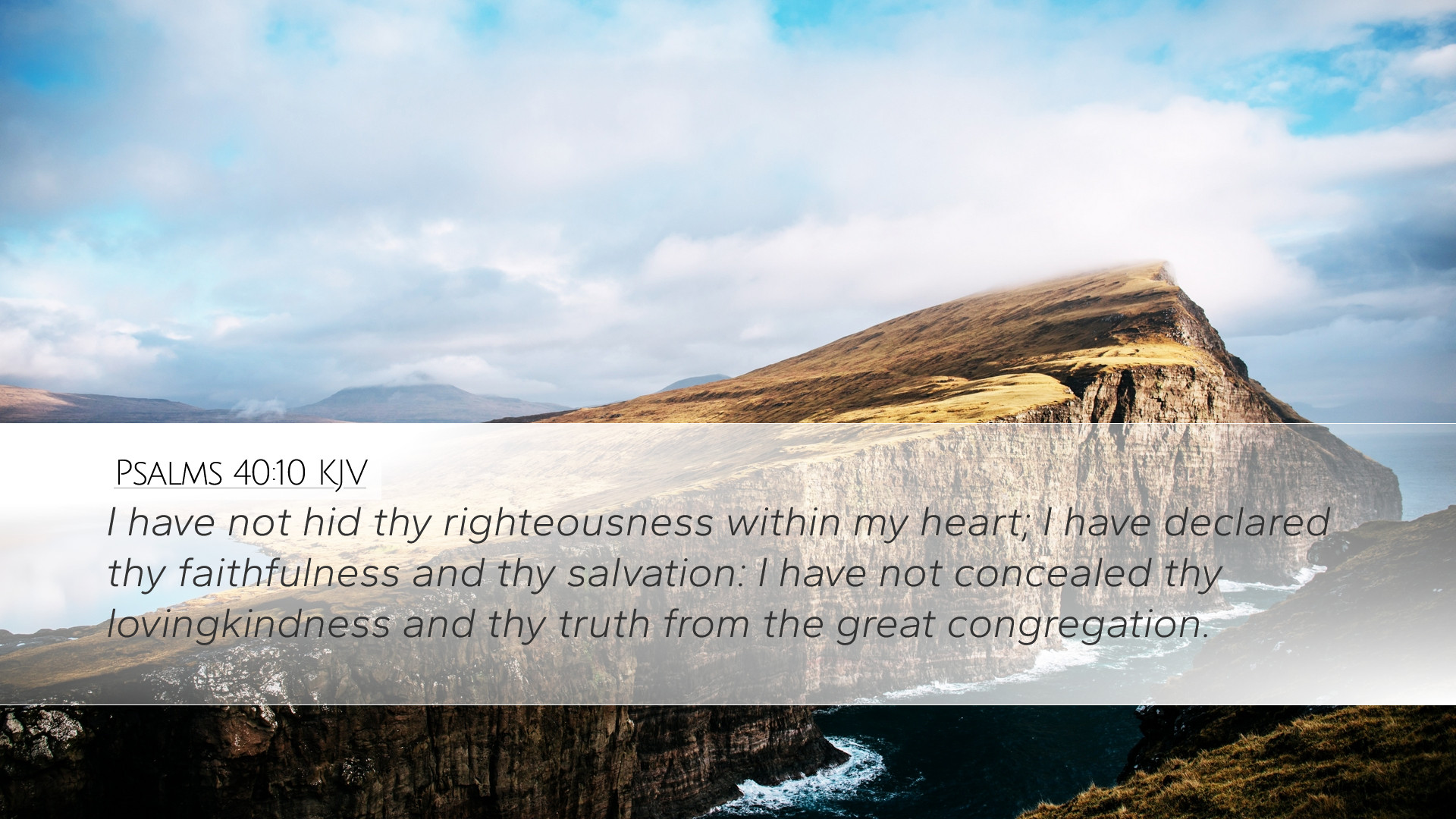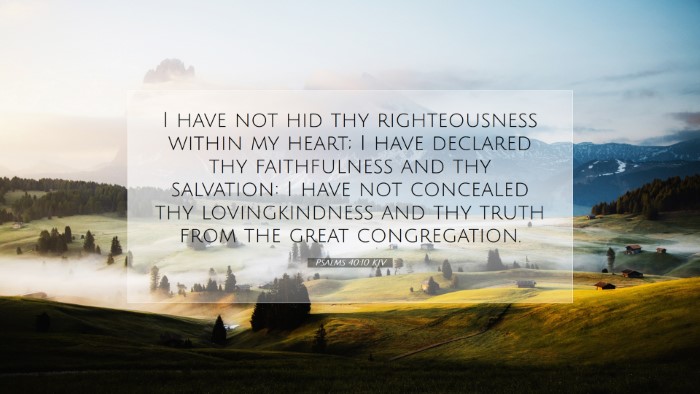Psalms 40:10 - Commentary Summary
Verse (Psalms 40:10): "I have not hid thy righteousness within my heart; I have declared thy faithfulness and thy salvation: I have not concealed thy lovingkindness and thy truth from the great congregation."
This verse encapsulates a profound declaration of faith and a commitment to witness. The psalmist emphasizes openness and the importance of proclaiming God's righteousness, faithfulness, and lovingkindness before others.
Insights from Commentaries
Matthew Henry's Commentary
Matthew Henry highlights the central theme of the psalm as one of gratitude for God's deliverance and faithfulness. It serves as an acknowledgment that the psalmist's experience of salvation compels him to testify openly to others. Henry notes:
- Non-Concealment of Righteousness: The psalmist openly claims God's righteousness, portraying it as an essential element of his testimony. Henry underscores that righteousness should be both an inward reality and an outward proclamation.
- Faithfulness and Salvation Declared: The act of declaring God's attributes—faithfulness and salvation—serves as a public testimony. For Henry, sharing one’s experiences of God's salvation is crucial in encouraging others in faith.
- Lovingkindness and Truth: By not concealing God’s lovingkindness and truth, the psalmist sets an example for believers to be publicly vocal about their faith, thus reflecting God's character to the world.
Albert Barnes' Notes on the Bible
Albert Barnes delves into the implications of this verse regarding the psalmist's resolve to maintain an honest witness. He argues that:
- Personal Experience and Witness: Barnes emphasizes that an effective testimony flows from personal experience. The psalmist confidently speaks of God's righteousness, having deeply encountered it himself.
- Public Testimony: The mention of the "great congregation" signifies the necessity of public proclamation among believers. The verse illustrates how believers should not shy away from discussing God's work in their lives, especially in communal settings.
- Integrity in Testimony: Barnes also underlines the necessity of integrity and openness. The psalmist's commitment to honesty in declaring God's nature serves as a challenge to modern believers to live authentically.
Adam Clarke's Commentary
Adam Clarke presents reflections on the various components of the verse, where he points out the profound commitment to proclaim God’s character. He particularly notes:
- Righteousness in the Heart: Clarke differentiates between a lively heart experience of God's righteousness and a passive acknowledgment. The necessity of having God’s righteousness internalized is crucial to the psalmist's declaration.
- Faithfulness, Salvation, and Community: Clarke emphasizes the communal aspect of faith. The psalmist’s declaration extends beyond the self to involve the wider congregation, calling believers to communal responsibility in testifying about God.
- Unconcealed Attributes: The lovingkindness and truth of God should not be kept secret. Clarke argues that the psalmist's wish to proclaim these attributes underscores the nature of God as both relational and covenantal, further urging believers to declare God’s goodness to all.
Overview of Theological Implications
This verse encourages a holistic view of testimony in the life of a believer. It reminds pastors, students, theologians, and Bible scholars that moments of personal salvation should lead to public declarations of God's attributes.
- The Interrelation of Experience and Testimony: The experience of God's saving grace serves as a foundation for effective witness. Without personal encounter, testimony can appear hollow.
- The Role of Community: The psalmist's call to declare God’s faithfulness revolves around the understanding that faith is often nurtured within communal settings. This informs pastoral practices today regarding the importance of testimony in church gatherings.
- Integrity in Faith: Authenticity is crucial in testimony; it must reflect true heart conditions. The psalmist’s integrity in declaring God's righteousness serves as a compelling example for all believers.
Practical Applications
For contemporary application, this verse offers valuable lessons:
- Encouraging Open Testimony: Church leaders can encourage members to share their personal stories of faith, fostering an environment where testimony is valued and promoted.
- Building Community Around Faith: Creating spaces where congregants can gather to share and declare the goodness of God strengthens community ties and cultivates collective faith.
- Modeling Integrity: Pastors and leaders are called to lead by example, showcasing how personal integrity and openness in faith can inspire others to do the same.
Conclusion
Psalms 40:10 serves not only as a personal declaration of faith but also as a foundational text that encourages believers to proclaim God's righteousness, faithfulness, and lovingkindness in community. The insights from public domain commentaries illuminate the depth of this verse, inviting pastors, students, theologians, and scholars to appreciate and actively participate in the rich tradition of testimony within the Christian faith.


